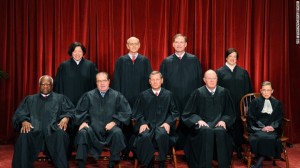What happens if a public official simply refuses for follow a Supreme Court ruling? In Kentucky, we’re about to find out as a clerk, an elected position in the Bluegrass State, says she’s answering to a higher authority – God. Others are noting contempt: “She’s certainly in contempt of court by any definition of the term, so the District Court has an array of sanctions it can resort to, to deal with that,” said Daniel J. Canon, a lawyer for some of the same-sex couples seeking licenses. “It can levy civil or criminal sanctions against her, and we had hoped that it would not come down to that.”
It’s all taking place in a college town, Morehead, which is home to Morehead State University.
